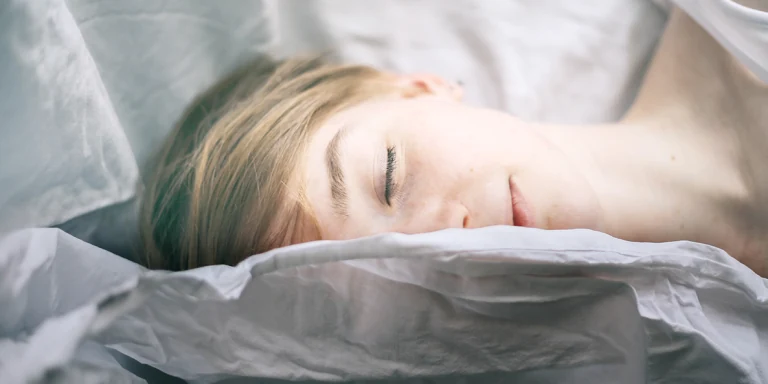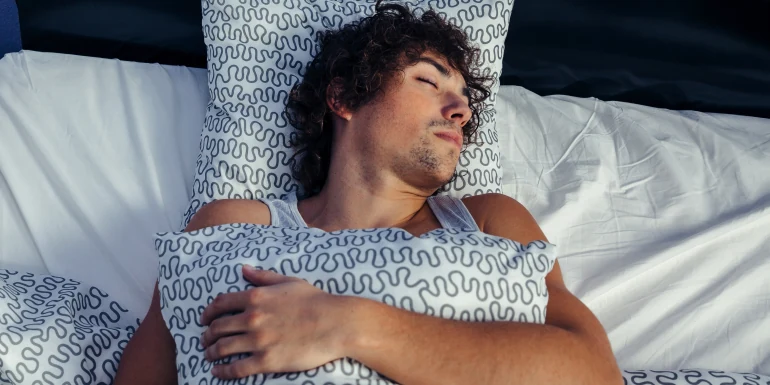
10 tips for better sleep
Fall asleep quickly, sleep through the night and start the next day well-rested: these practical sleeping tips will help you create the perfect conditions for a good night’s sleep.
Falling asleep quickly and waking the next morning feeling refreshed. That’s what we all want from our sleep. But this is rarely the case in reality: we wake up during the night and our sleep is completely disrupted. Or we struggle to relax properly in the evening and can’t get to sleep because of all the thoughts swirling around in our heads.
These and similar problems with getting to sleep affect one in three people in Switzerland. Don’t put yourself under pressure. Sleep is very individual. Waking up feeling rested is more important than how long you sleep for. The following tips will help you with your sleep.
Fall asleep faster with routines and other tricks
1. Make regular sleep times a habit
Try to always go to bed and get up at the same time. You should even get up around the same time at the weekend too. How long you sleep for and when you go to sleep are completely individual, so you should pay attention to your own biorhythm. This is the only way that you will feel rested in the morning.
2. Develop a calming evening routine
Make sure that you can relax before you go to sleep. Read a book, meditate on a regular basis, or drink some tea (valerian tea, lemon-balm tea, hop tea and lavender tea are all particularly good for promoting sleep). When you’re relaxing, avoid falling asleep in front of the TV. Autogenic training can also help with getting to sleep.
3. Treat yourself to a warm bath with essential oils
Have you had a particularly arduous day? A warm bath will help you relax, and adding scented essential oils to the water – such as lavender or lemon balm – can promote sleep. Lie in warm water of between 35 and 38°C for 10 to 20 minutes. Your body temperature will increase in the bath and then slowly fall again afterwards. This process signals to your brain that it is time to sleep.
4. Switch off your screens a while before going to bed
Aim to turn off your mobile phone, tablet or computer at least 30 minutes before going to sleep. Their blue light waves prevent your body from producing the sleep hormone melatonin.
5. Create an atmosphere that promotes sleep – and ensure the perfect temperature for sleep
Make sure that your bedroom is quiet, cool and dark. Light will stop you from getting to sleep as easily because it inhibits the production of the sleep hormone melatonin. The ideal temperature for sleeping is between 15 and 18°C, but definitely not higher than 20°C.
Experiment with what is a comfortable temperature for you, as neither sweating nor freezing will help you enjoy a restful night’s sleep. You should also avoid going to bed with cold feet. If you do, then your body won’t be able to cool down to the temperature needed for sleeping and you won’t be able to drift off. Make sure that your bedroom is free from work-related items too – this will make sure you can really switch off.
6. Exercise – and do something like yoga in the evening before bed
You should exercise regularly when the sun is up. Doing sport reduces stress and increases feelings of well-being. But is doing exercise before bed a good thing? You should listen to your body. Does sport make you feel pumped with energy? If so, you should opt for a more relaxing activity in the evening. Many people find that yoga, meditation or breathing exercises help them to fall asleep. Try out a few techniques to discover what helps you drift off. In the Helsana Coach app, you’ll find various exercises to assist with this.
7. Be mindful of what you eat and drink – and when – before going to bed
Caffeine and alcohol can disrupt your sleep and keep you awake, so you should keep your consumption of these to a minimum – and avoid caffeinated drinks from the afternoon onwards. Your evening meal should be easily digestible and preferably rich in protein.
Having too many carbohydrates before bed will increase your blood sugar and release insulin, which will disrupt your sleep. Mediterranean food appears to be particularly conducive to sleep: think about having fruit and vegetables, pulses, nuts, olive oil and fish.
And when is the ideal time for dinner? Should you eat before going to bed? If you want to have a good night’s sleep, it is best to avoid eating for an hour before going to sleep. That said, you shouldn’t go to bed hungry either because that will keep you as awake as being full. If you’re hungry before bed, you should opt for a handful of nuts or a ripe banana.
8. Write a to-do list
Do you struggle to turn your thoughts off at night and therefore stay awake? Writing them down can help: jot down what you experienced throughout the day and what is on your mind. Also write down what you want to achieve the following day. Making notes allows you to relax mentally, helping you get things in order and enjoy a sense of internal calm.
9. Resolve problems during the day
To stop unresolved problems catching up with us at night, we should try to deal with them during the day. Chronic stress, anxiety, and other sources of pressure can rob us of sleep. Depending on the problems and how severe they are, coaching or psychological support may be worthwhile.
10. Get out of bed if you are lying awake
It is no good to toss and turn in bed for hours on end. Instead, you should get out of bed and read a book – but make sure you avoid screens.
Helsana Coach app: tips for improved sleep
Sleep is important for our well-being. Getting enough sleep doesn’t just set us up for the day ahead: it also has a positive influence on our health in the long run – both physically and mentally. You’ll find great tips and exercises for this in the Helsana Coach app.
Why can’t I sleep?
If you have tried these tips and are still having problems with your sleep, you should seek professional help to look into the causes. Speak to your GP.
In many cases, a referral to a sleep laboratory is the right way to go. What happens at a sleep laboratory? And what happens afterwards? In this video, sleep expert Helen Slawik provides some answers. The doctor, who heads the clinical sleep laboratory at University Hospital Basel, explains how to overcome sleep problems.
Our health advisors can give you tips on how to get better rest. They will talk to you to find out what might be stopping you from sleeping and what actions and steps might be appropriate.

The expert provided the editorial team with advice and input for this article. Julia Pieh (doctorate in pharmacy and toxicology, pharmacist, naturopath) works in the Helsana Health Consultation Service.


Newsletter
Find out more about current health issues every month and get all the information you need about our attractive offers from all Helsana Group companies * delivered by e-mail to read whenever it suits you. Our newsletter is free of charge and you can sign up here:
We did not receive your information. Please try again later.
* The Helsana Group comprises Helsana Insurance Company Ltd, Helsana Supplementary Insurances Ltd and Helsana Accidents Ltd.
